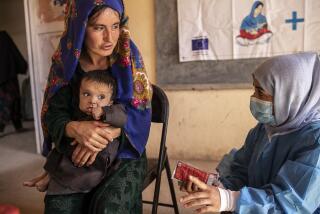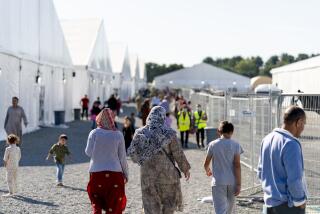Donors Ponder How to Spend Afghan Funds
- Share via
TOKYO — With $4.5 billion in Afghanistan reconstruction funds pledged at a two-day conference that ended today, officials from the United States and other donor countries are settling down to a far more difficult task: figuring out how to spend the money effectively in a nation that needs almost everything.
“We’re seeing a country that’s being born out of dust,” said Torek Farhadi, economic advisor to the interim Afghan government. “People tell us, ‘Give us a report of what you need.’ We don’t know what we need. It’s a work in progress.”
Although the pledge total--including $1.8 billion earmarked for this year--is below the $10-billion, five-year benchmark set by the United Nations, it represents a strong start. Several nations said they would be back with more in coming years.
China, India and Pakistan each offered $100 million for this year, on top of the combined $1.3 billion pledged by the United States, Japan and the European Union and the $220 million offered by Saudi Arabia.
“We’re seeing an excellent amount,” said Hedayat Amin Arsala, Afghanistan’s interim finance minister, at the close of the conference.
Now that the funds have been pledged, decisions must be made about how to spend the money. U.S. officials, their foreign counterparts and members of international aid organizations emphasized that the final determinations must be made by the Afghan government in order for the money to have a lasting impact.
Afghan Officials Want a National Military
But there were early indications that some Afghan priorities may not be embraced as enthusiastically by the international community. Afghan officials, for instance, repeatedly cited the need to build a national military to secure the country’s borders and limit the sort of meddling by neighboring powers that helped reduce Afghanistan to a breeding ground for warlords and terrorists.
“We can’t rebuild Afghanistan, a country that’s been victimized by 23 years of war, without thinking about basic security,” said Omar Samad, a spokesman for Afghanistan’s Foreign Ministry. “For us, it’s a top issue.”
Many donors, however, did not put creation of an Afghan military at the top of their list.
“Police, yes, but straightforward military expenditures, probably not,” said Alastair J. McKechnie, the World Bank’s country director for Afghanistan.
The idea of earmarking grant money to build an Afghan government and pay bureaucrats’ salaries likewise met with some resistance.
“As we saw in East Timor and Kosovo, donors aren’t very keen on paying for government,” said Chris Patten, external affairs commissioner for the European Union. “They want to fund projects. But someone has to pay for government. This is the challenge we face.”
Aid agencies and major contributors also debated in meeting rooms and corridors whether aid should be distributed directly by donor governments or through a centralized trust fund overseen by multilateral agencies.
Large nations such as the United States argue that direct disbursement puts the money in Afghanistan much faster. International agencies counter that pooled funds produce a more coordinated rebuilding effort, with less corruption and waste. In previous reconstruction efforts, some nations have been faced with the task of completing thousands of separate reports to different donors about how funds were spent.
Health, Food, Roads and Education Are Priorities
Despite some inevitable disputes over methodology and tactics, experts said most contributors at the conference agreed on the overall objectives, including the importance of allocating money quickly for food, roads, education and health care.
Programs that offer quick dividends in several priority areas also are being pushed, officials said. Food-for-work projects, for instance, are popular with Afghans, many of whom would rather be paid in food than the mercurial, highly speculative afghani, the national currency.
In addition, such projects create jobs, boost the economy and reduce the ranks of people who might be tempted to harvest poppies for the drug trade or join militia groups. Road repairs help get fertilizer and seeds to farmers, surplus crops to famine areas and people to local markets.
Likewise, rehiring female civil servants and teachers--who filled 43% of government jobs before the Taliban regime prohibited women from working--will help rebuild the education system, boost women’s role in society and expand the nation’s knowledge base.
The interim Afghan government has outlawed poppy production. It has promised to fight corruption, help the disabled, share power among all ethnic groups, build a free-market economy, audit major contracts, restore women’s rights and set up a fair legal system.
But major contributors have warned that they will be looking for, among other steps, long-term progress toward rebuilding the country and movement toward real democracy as preconditions for future aid.
Even if Afghanistan turns out to be a model student, international enthusiasm for rebuilding the Central Asian nation could drop off as taxpayers lose interest or get distracted by a new crisis.
Secretary of State Colin L. Powell reiterated Monday that the U.S. remains committed for the long haul. But Samad, the Afghan Foreign Ministry spokesman, said his country already has seen donor nations lose interest in a relatively modest $20-million fund earmarked for the Kabul administration, and this is only the beginning. World Bank President James D. Wolfensohn even joked that donors should leave their checks at the door.
Afghanistan’s interim government, headed by Prime Minister Hamid Karzai, has only five more months before it faces possible replacement at the hands of a loya jirga, or traditional Afghan governing council. Political stability is a prerequisite for any rebuilding effort, and the current government is under considerable pressure to show it has what it takes long-term.
So far, said foreign and Afghan officials at the conference, the new group is off to a good start.
“A government that can return to Kabul and say we’ve brought you $2 billion in pledges is pretty darned credible,” said economic advisor Farhadi.
More to Read
Sign up for Essential California
The most important California stories and recommendations in your inbox every morning.
You may occasionally receive promotional content from the Los Angeles Times.










